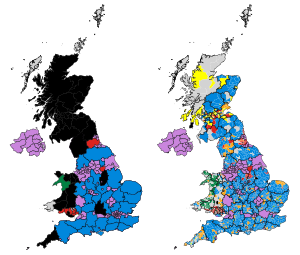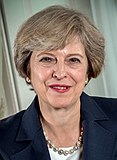
Back Etholiadau lleol gwledydd Prydain 2017 Welsh Élections locales britanniques de 2017 French 2017年英國地方選舉 Chinese
| |||||||||||||||||||||||||||||||||||||||||||||||||||||||||||||||||||||
All 27 county councils, all 32 Scottish council areas, all 22 Welsh principal councils, 6 out of 55 unitary authorities, 1 out of 36 metropolitan boroughs, 1 sui generis authority, and 8 directly elected mayors | |||||||||||||||||||||||||||||||||||||||||||||||||||||||||||||||||||||
|---|---|---|---|---|---|---|---|---|---|---|---|---|---|---|---|---|---|---|---|---|---|---|---|---|---|---|---|---|---|---|---|---|---|---|---|---|---|---|---|---|---|---|---|---|---|---|---|---|---|---|---|---|---|---|---|---|---|---|---|---|---|---|---|---|---|---|---|---|---|
| Turnout | 35%[1] | ||||||||||||||||||||||||||||||||||||||||||||||||||||||||||||||||||||
| |||||||||||||||||||||||||||||||||||||||||||||||||||||||||||||||||||||
 Map showing council control (left) and largest party by ward or division (right) following the election. | |||||||||||||||||||||||||||||||||||||||||||||||||||||||||||||||||||||
The 2017 United Kingdom local elections were held on Thursday 4 May 2017. Local elections were held across Great Britain, with elections to 35 English local authorities and all councils in Scotland and Wales.
Newly created combined authority mayors were directly elected in six areas of England: Cambridgeshire and Peterborough, Greater Manchester, the Liverpool City Region, Tees Valley, the West Midlands, and the West of England.[3] In addition, Doncaster and North Tyneside re-elected local authority mayors.[3] Local by-elections for 107 council seats also took place on 4 May.[4]
The Conservative Party led under Prime Minister Theresa May enjoyed the best local election performance in a decade, making significant gains at the expense of the Labour Party.[5] The UK Independence Party lost every seat they were defending, but gained just one seat at the expense of the Labour Party.[5] The Liberal Democrats lost 41 seats, despite their vote share increasing.[6][7][8] The Conservatives won four out of six metro-mayoral areas,[9] including in the traditionally Labour-voting Tees Valley and West Midlands.
The local elections were followed by a general election on 8 June.
- ^ Daniel Wainwright (9 April 2019). "Council elections: Why don't people vote?". Retrieved 20 April 2019.
- ^ "Scotland Results". BBC News.
- ^ a b "Election 2017: English mayoral candidates". BBC News. 5 April 2017. Retrieved 30 April 2017.
- ^ "Local Elections Preview, Part I". election-data.co.uk. 28 April 2017.[permanent dead link]
- ^ a b "Tories set for best local election results in decade as UKIP obliterated". The Telegraph. Retrieved 5 May 2017.
- ^ Elgot, Jessica (5 May 2017). "No Lib Dem resurgence at local elections but share of votes increases". The Guardian. ISSN 0261-3077. Retrieved 5 May 2017.
- ^ "The New Statesman 2017 local elections liveblog". www.newstatesman.com. Retrieved 5 May 2017.
- ^ "Local elections 2017: Tories make early gains". 5 May 2017. Retrieved 5 May 2017 – via bbc.co.uk.
- ^ Smith, Mikey (5 May 2017). "Follow all the UK local election results 2017 LIVE". mirror. Retrieved 6 May 2017.
Cite error: There are <ref group=n> tags on this page, but the references will not show without a {{reflist|group=n}} template (see the help page).
© MMXXIII Rich X Search. We shall prevail. All rights reserved. Rich X Search




